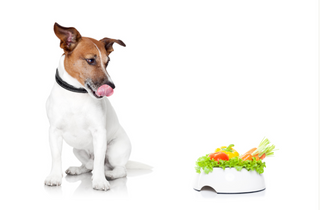Fruits and Vegetables Your Pet Can Safely Eat

As humans, we all know how important fruits and vegetables are for our health. Abundant in vitamins, minerals, and fiber and low in calories, fruits and veggies are some of the most nutritious things that we can eat. It might also surprise you to know that some of these delicious and nutritious foods can also be beneficial to your pet’s health.
Although many of us like to share household food with our furry friends, not all human food is appropriate or safe for your pet to eat. To help you out, the experienced vets at Avondale Animal Hospital have put together this guide to fruits and veggies your pet can safely enjoy.
Fruits and Vegetables that are Safe for Dogs
Dogs are omnivores, meaning they can eat meat or plant-based food. In fact, most dog kibble is a combination of meat protein and vegetable matter. One way you can enrich your dog’s diet is by adding extra fruits and vegetables on top of their kibble. This can be especially beneficial for dog’s suffering from weight problems or diseases, like diabetes. With that said, your canine companion can enjoy the taste and nutritional benefits of a large variety of different fruits and vegetables. Some of the healthiest fruits and veggies for dogs include:
-
Apples. These are a great source of Vitamins A & C, and packed full of fiber to keep your dog’s digestive system working effectively. Just be sure to remove the core and seeds before feeding an apple to your pet.
-
Bananas. Rich in potassium, vitamins, and copper, bananas are exceptionally sweet, and they’re also safe for your furbaby to eat. Due to their high sugar content, bananas should only be given occasionally and regarded firmly as a treat.
-
Blueberries. Blueberries are full of antioxidants and fiber, which can help defend your pet from cancer.
-
Broccoli. This dark green vegetable is safe for your pet to eat, but only in very small quantities, as broccoli is fibrous and can lead to diarrhea.
-
Brussel sprouts. Beware - the gassy effects of these vegetables are just as prevalent in dogs as they are in humans!
-
Cantaloupe. Feed this delicious melon sparingly, as it is high in natural sugar.
-
Carrots. Carrots are high in vitamins and fiber, and their fibrous nature can brush away tartar, making them good for your dog’s teeth!
-
Celery. Similar to carrots, celery is another low-calorie vegetable that will naturally scrub your dog’s teeth.
-
Cucumbers. Cucumbers are safe another safe low-calorie snack for dogs. However, don’t feed your pup too much, since it can cause an upset stomach.
-
Green beans. Fresh green beans are chock full of iron and vitamins, making them a healthy option for your dog. Remember to only feed your pup fresh green beans, as canned ones usually have added salt.
-
Mango. Don’t forget to remove the stone before feeding as it contains a small amount of toxic cyanide, and could potentially cause your dog to choke. Like bananas, mangoes can be fed as a sweet treat.
-
Oranges. These should be peeled, and all seeds removed before feeding to your canine pal to avoid choking hazards.
-
Peaches. Again, cut around the pit and remove it before offering it to your furbaby.
-
Pears. Don’t forget to remove the pit and stones from pears too!
-
Potato. Stick with boiled, plain varieties. If your dog is prone to an upset stomach, a good mealtime option is plain boiled chicken and potatoes with no added ingredients.
While there is a range of fruits and veggies that are safe for your dog to consume, some varieties can also be toxic. Some of the most popular fruits and veggies that you should avoid feeding your dog include garlic, onion, mushroom, avocado, and rhubarb. If you are unsure if your pet should be eating something, make sure you ask one of our vets, and we will be happy to answer any questions regarding your pet’s health and nutrition.
Fruits and Veggies that are Safe for Cats
Cats are carnivores, which means that their diet should be primarily protein-based. Your feline friend doesn’t actually need fruits or vegetables in her diet to remain healthy, but they do make a good alternative to high-calorie treats. Here are some of the safest fruits and vegetables that you can share with your kitty.
-
Asparagus (steamed)
-
Baked carrots
-
Bananas
-
Blueberries
-
Carrots (steamed)
-
Cooked winter squash
-
Green beans and/or Broccoli (steamed only)
-
Melon
-
Peas
-
Pumpkin
-
Spinach

